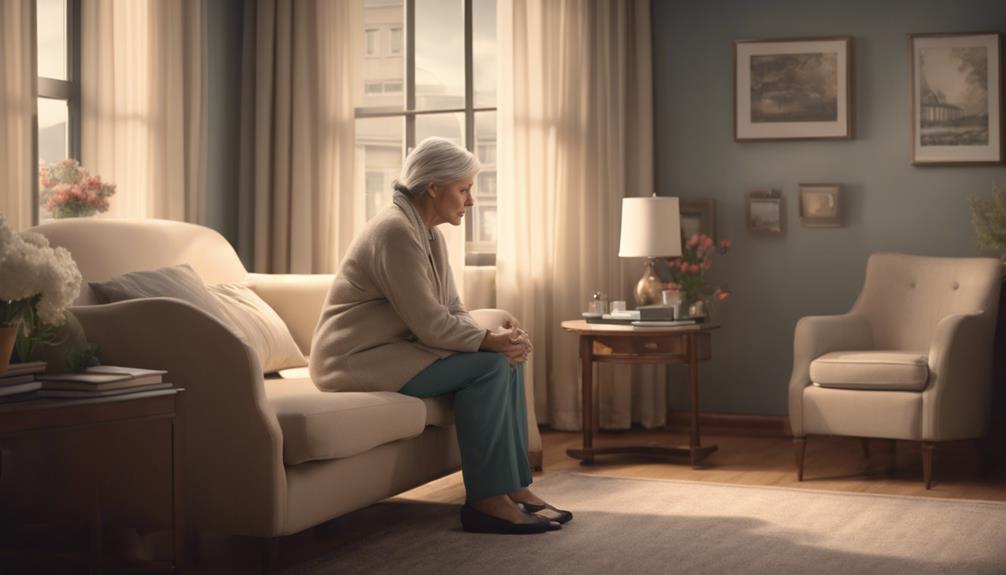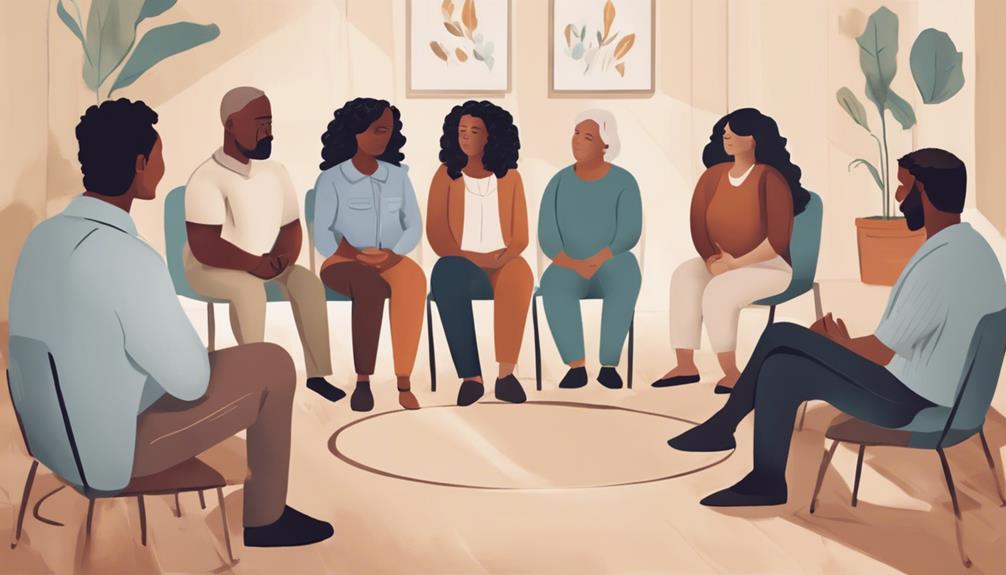Complicated grief can now be effectively treated without medication, providing a significant alternative. This therapy focuses on processing emotions and learning coping skills. Psychotherapy offers a safe space for feelings, validation, and support. Tailored approaches are used to address individual needs, maximizing positive outcomes. Customized techniques promote holistic well-being without the need for medication. These techniques include restructuring thoughts, addressing avoidance behaviors, and enhancing support. These therapies have been shown to be effective in reducing symptoms of complicated grief. Learn more about this exciting breakthrough in grief treatment.
Key Takeaways
- Non-medicated grief therapy validated as effective treatment for complicated grief.
- Therapy demonstrates significant reductions in grief symptoms.
- Provides alternative to medication for managing grief.
- Emphasizes emotional processing and coping skill development.
- Study legitimizes non-pharmacological interventions for effective grief treatment.
Research Findings on Non-Medicated Grief Therapy
Research findings demonstrate the effectiveness of non-medicated grief therapy in treating complicated grief. This therapy-based approach offers a valuable alternative for individuals hesitant about medication. Through therapy alone, significant reductions in grief symptoms have been observed, highlighting the potential of non-medicated grief therapy as a pivotal treatment option.
By addressing complicated grief without pharmacological intervention, this approach shows promise in providing support and healing for those struggling with intense feelings of loss and sadness. The results suggest that non-medicated grief therapy can play an essential role in helping individuals navigate their grief journey. Many therapeutic techniques, such as cognitive behavioral therapy and mindfulness practices, focus on helping individuals process their emotions and restructure negative thought patterns. This holistic approach can be particularly beneficial when individuals face overlapping symptoms, such as asking themselves, “does depression lead to appetite loss?” and navigating complex mental and physical health changes during the grieving process. By fostering emotional resilience and providing coping strategies, non-pharmacological interventions offer a path toward healing that encompasses both mind and body.
This therapy-based approach emphasizes the importance of processing emotions, building coping skills, and fostering resilience in the face of loss. For those seeking a non-medicated option to manage complicated grief, therapy can offer a supportive and empowering path towards healing and recovery.
Benefits of Psychotherapy for Grief Management

Moving from the exploration of non-medicated grief therapy's effectiveness, we now turn to the benefits of psychotherapy for managing complicated grief. Psychotherapy offers numerous advantages when dealing with the loss of loved ones. Here are three key benefits to take into account:
- Emotional Processing: Psychotherapy provides a safe space for individuals to express and process their emotions surrounding the loss of loved ones. Therapists can help individuals navigate through their complex feelings, leading to a healthier grieving process.
- Improved Coping Skills: Through therapy sessions, individuals can learn and develop effective coping mechanisms to deal with the challenges of grief. These skills can empower individuals to manage their emotions and navigate through difficult times.
- Validation and Support: Psychotherapy offers individuals validation for their feelings and experiences, creating a sense of understanding and support. This validation can help individuals feel less alone in their grief journey and provide comfort in knowing that their emotions are valid and acknowledged.
Tailored Approaches for Complicated Grief Treatment
Tailored approaches for complicated grief treatment emphasize addressing individual symptoms and needs to provide more effective and personalized interventions. By customizing therapy plans, we can offer specialized care that targets the unique aspects of each family member's grief experience. This tailored treatment may involve a blend of psychotherapy techniques selected based on the specific challenges faced by the individual. Through individualized care, we maximize the likelihood of successful treatment outcomes for complicated grief.
| Benefits of Tailored Approaches for Complicated Grief Treatment |
|---|
| 1. Personalized interventions for individual needs |
| 2. Targeted therapy plans for unique symptoms |
| 3. Customized techniques for specific challenges |
| 4. Improved treatment outcomes through individualized care |
Tailored approaches make certain that each family member receives the support and assistance necessary to navigate their grief journey effectively. By tailoring interventions to address personal needs, we can provide more meaningful and impactful assistance in coping with complicated grief.
Validated Non-Pharmacological Interventions

Validated non-pharmacological interventions provide effective treatments for complicated grief by addressing unique symptoms and challenges without the use of medications. When seeking help for complicated grief, consider the following:
- Personalized Support: Non-pharmacological interventions offer personalized care tailored to individual needs, providing a sense of understanding and comfort during the grieving process.
- Coping Strategies: These interventions equip individuals with practical coping strategies to manage the intensity of grief reactions and navigate challenging emotions effectively.
- Holistic Approach: By approaching grief from an all-encompassing perspective, non-pharmacological treatments consider the interconnectedness of physical, emotional, and mental well-being, fostering a thorough healing process.
When facing complicated grief, reaching out to a professional who can help guide you through these validated non-pharmacological interventions can make a significant difference in your journey towards healing. Remember, you don't have to navigate this challenging time alone; support and effective treatment options are available to assist you in coping with complicated grief.
Specialized Therapeutic Techniques for Grief
When exploring specialized therapeutic techniques for complicated grief, it's fundamental to understand the effectiveness of interventions such as Complicated Grief Therapy (CGT) and Cognitive Behavioral Therapy (CBT).
CGT focuses on restructuring thoughts, addressing avoidance behaviors, and promoting emotional expression to alleviate symptoms of complicated grief. On the other hand, CBT aims to challenge negative thought patterns, develop coping strategies, and improve emotional regulation in individuals struggling with complicated grief.
Techniques like imaginal revisiting, meaning reconstruction, and enhancing social support are integral parts of specialized therapeutic approaches for complicated grief. Research shows that these specialized therapeutic techniques can effectively reduce symptoms of complicated grief without the need for medications.
Frequently Asked Questions
What Has Been Proven to Be the Most Effective Response to Complicated Grief?
We've found that complicated grief therapy is the most effective response to complicated grief. It focuses on processing emotions, addressing maladaptive thoughts, and fostering adaptation to loss. This therapy is proven to be more beneficial than traditional grief counseling.
What Are the 3 C's of Grief?
Coping with grief involves the 3 C's: coherence, connection, and continuity. We make sense of loss (coherence), stay linked to memories (connection), and keep pursuing our goals (continuity). These pillars help us navigate grief's challenges.
What 7% of Bereaved People Might Experience Complicated Grief?
7% of bereaved individuals might experience complicated grief, characterized by intense and prolonged grief reactions. Those affected may struggle to accept the death, yearn persistently, and have difficulty moving forward, impairing daily functioning.
What Is the Best Evidence Based Treatment for Grief?
The best evidence-based treatment for grief is Complicated Grief Treatment (CGT). It involves 16 sessions with techniques like cognitive restructuring and building life skills. Research supports its efficacy in reducing symptoms and improving overall functioning.
Conclusion
To summarize, research has shown that non-medicated grief therapy can be as effective as medication in treating complicated grief. While some may be skeptical about therapy without medication, studies have proven its success in helping individuals cope with loss.
It's important to remember that everyone's grief is unique, and finding the right approach to healing is essential. By seeking help from a trained therapist, those struggling with complicated grief can find comfort and support in their journey towards healing.









